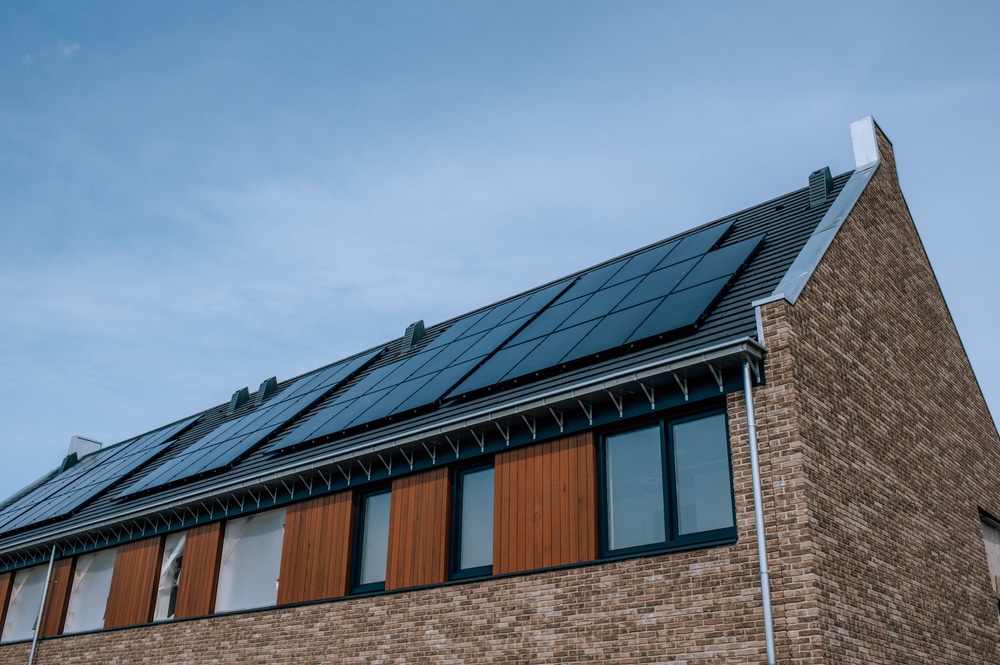Jasmine Birtles
Your money-making expert. Financial journalist, TV and radio personality.

Have you ever considered how green your money is? Have you investigated your pension investments or bank account to see how environmentally friendly they are? You may not have even considered it before now. The way we spend and invest our money can have environmental impacts.
We all try to do our bit for the environment, especially with the looming cloud of a climate crisis looking closer than ever. Whether you recycle all you can, carry a reusable water bottle or take your own carrier bags when shopping, we all make small efforts to protect our environment.
But did you know there are even easier ways to protect the environment? Ways which require no effort from your standing and don’t cost a single penny? Making your money greener is one of the most beneficial acts for the environment which you can do from the comfort of your sofa.
Companies globally are waking up to consumer demands for greener options and are offering more environmentally friendly deals to their customers. Plus, you don’t have to spend more or lose out as green seeps into the forefront of business’ minds.

When you open a pension, you will automatically be put on a standard investment level. This means your pension contributions will be automatically invested in a variety of ways.
Unfortunately, some of these investments may be in non-ethical companies. These companies may be involved in the sale or production of tobacco or oil or have a large carbon footprint associated with them.
Luckily, you have a say in what your pension is invested in, and green pensions may well be the way forward. In fact, research shows a green pension is up to 21 times more effective than common climate change efforts. This could be even more effective than giving up flying, cutting meat from your diet or even choosing a more sustainable energy supplier.
This research, from Make My Money Matter, suggests greening your pension might be the single most effective action an individual can take to reduce their carbon footprint. It could, in fact, be one of the largest weapons we have as individuals to do our bit for the climate.
For those with an average size pension pot, approximately £30,000 in the UK, as much as 19 tonnes of carbon could be saved per year when switching to a sustainable pension. If you happen to have at least £100,000 saved, a green pension might cut as much as 64 tonnes of emissions every year. This is approximately nine years’ worth of the average UK citizen’s carbon footprint.
People across the UK are also opening up to the idea. In fact, 68% of UK savers say they want their investments to have the planet in mind. 44% of consumers say they would happily switch to a green pension if offered one.
So, what are some of the best green pension options out there?
Aviva offer multiple responsible investment options. There are funds available which take environmental, social and governance (ESG) factors into consideration. There are numerous funds available for you to research and select that focus specifically on ESG and responsible investment goals. This includes investing in companies which focus heavily on their environmental impacts.
They offer ready-made, convenient funds as well as lists of funds chosen by their experts. There is also a full list of funds which give more detail, which you can filter down to find available ESG and sustainable funds.
Whatever your values and goals may be with your pension, green investments can create a better world to both live and retire in. You can find more about the responsible investments Aviva offer here.
Pension provider Nest carefully consider the ways in which the companies and markets their members invest in treat both people and the planet. Sound environmental and social practices have a better chance of profitability long term, as well as improving the environment.
They actively encourage their members to choose sustainable investments as well as looking to boost their pension pots as much as possible and boost profitability. Responsible and ethical investing is at the very heart of Nest and is one of their core investment beliefs.
Nest offer an Ethical Investment Fund which not only takes into account sustainability, but also morals. Everyone who is with Nest is automatically put into responsible investments no matter which fund they have, but ethical funds consider the moral goals of companies in terms of human rights and whether they support practices such as the burning of fossil fuels and arms and weapons creation.
You can read more on Nest here.
For over 200 years, Scottish Widows has been helping people plan for their futures and save for their retirement. They are determined to use their scale and influence to not only help their millions of members plan for long-term financial prosperity but challenge the companies they invest in and ensure they are practicing as sustainably as possible.
Scottish Widows are striving to challenge climate change. Not only does climate change have implications in every aspect of our lives, but it can impact both our savings and investments. They focus on a low-carbon future and take opportunities to decarbonise all of their investments. They hope to reach net zero by 2050.
As with Nest, they focus on ethical and moral investments When it comes to having a direct positive impact on the planet, and aligning moral values and beliefs, impact and ethical investing come into play.
You can read all about Scottish Widows and their pensions here.

Homes are one of the largest sources of carbon dioxide emissions in the UK. Looking into a green mortgage is often a great way to both reduce emissions and do your bit for the planet.
Most mortgage lenders offer valuation surveys as part of their mortgage deals. However, there are still few offering surveys with a specialised environmental view. Environmental surveys specialise in assessing the energy efficiency of a house and give buyers advice on available energy saving measures.
But which mortgage lenders currently offer environmental benefits and sustainable mortgages?
Lesser-known lender Ecology Building Society specialise in properties outside of the mainstream. This includes self-build mortgages for energy efficient construction and renovations and loans for buying woodland. Their services also include moorings for houseboats. These are funded through members’ saving accounts.
It is important to note that mortgages for non-standard and sustainable properties may be slightly pricier than the norm. Ecology won’t compare with the cheapest rates on the market, with a standard variable rate of 4.15%, however the help it offers the planet is priceless.
Once your property is complete, however, Ecology tend to discount this rate, depending on the energy savings your home is making. If you want to make your current home more energy efficient, Ecology will consider your project without a ‘tick box’ approach, looking at every application with fresh eyes.
You can read more about Ecology Building Society here.
Nationwide’s Green Additional borrowing scheme offers a 0.69% reduction on interest rates if over 50% of a loan is used to make your home more sustainable. Britain’s biggest mutual uses their size to offer this alongside good-value products for standard borrowers.
Sustainable developments include air and ground source heat pumps, double glazing and the replacement of windows and cavity wall insulation. You may also wish to install an electric car charging point at your home, a small-scale wind turbine, or opt for insulation of your loft, tanks and pipes.
Nationwide do not currently appear to require evidence of how much these measures have improved the efficiency of your house, but evidence of installation must be provided.
This is a wonderful incentive for those wishing to make their home more sustainable, however it is currently only available is you have a mortgage with Nationwide.
You can find out more about the Green Additional Borrowing Scheme here.
This mortgage from high-street giant Barclays currently offers low interest rates on mortgages for those buying a new property with an energy rating either in band A or B, or with a score above 81. The property must be bought from one of Barclays’ partner house building companies.
The availability of green mortgages within Barclays is still fairly limited, but their initial steps show they are starting to pay more attention to the energy efficiency of their portfolios.
You can read more here.

You may think your favourite supermarket is fairly sustainable. Perhaps you feel you are happy with where their meat, fish and other animal biproducts come from, or know they help local and national communities for the greater good.
However, you may be surprised to learn some of your favourite shops don’t stock RSPCA assured chicken or are ranked badly by the Business Benchmark for Farm Animal Welfare (BBFAW) ranks.
The BBFAW ranks companies based on the performance for animal welfare strategies. Marks and Spencer and Waitrose top the board, with Asda at the bottom of the ranks. Tesco, Sainsburys, Morrisons and the Co-op are in Tier 2, with Aldi in Tier 3 of 5.
The sustainability of fish sources is becoming an increasing concern for consumers, with many wanting certified sustainable and traceable seafood. The Marine Stewardship Council (MSC) gives supermarkets a percentage based on their levels of sustainability.
Aldi tops the list with a rating of 80%, followed by Sainsburys (76%), Lidl (72%) and Waitrose (67%). Bottom of the board sees Marks and Spencer, with a score of 19%, a surprise as they scored highly on the BBFAW rank. Morrisons and Iceland both hit the very bottom, both having scores under 5%.
To ensure you buy certified sustainable fish and seafood, look for the blue MSC tick logo on products.
When it comes to buying chicken, cruelty free, RSPCA assured meat is the best option, both for sustainability and taste! Not all supermarkets stock RSPCA assured chicken, and some don’t even offer organic options.
Aldi and Sainsbury’s are the only supermarkets to sell both RSPCA assured and organic chicken. Lidl and the Co-op both sell RSPCA assured chicken, but do not offer organic options. Waitrose, Tesco, Asda, M&S and Morrison’s are not RSPCA assured, but all offer organic chicken. Iceland does not offer either option.
Aldi and Sainsbury’s yet again offer sustainable options in the form of RSPCA assured bacon and pork. Lidl, The Co-op, Tesco and Asda also offer both. Surprisingly, high end supermarkets Waitrose and M&S offer neither.

Having an account with a bank which partakes in sustainable practices is just another way to help the planet. Plus, it doesn’t take much effort on your part. There are multiple to choose from, and all offer different benefits, for both your money and the planet.
A newer player in the banking game, Starling actively avoids fossil fuels, mining, arms and military and instead invests in high quality liquid assets. They also exclude businesses which deal in the manufacture and sale of tobacco.
Their carbon footprint is also significantly lower than other banks. This is because they are a paperless, branchless bank, separating it from many of its competitors.
Starling Bank is committed to developing business relationships with high-quality suppliers. They strive to create an ethical environment. No services or investments are made to companies which promote harmful behaviour..
They are also highly transparent about the ways in which they deal with members’ money and provide full documents on their transactions and dealings. Starling aim for good and also focus heavily on technological investments and ventures which ensure positive advances in.
However, it is worth noting that despite its longstanding opposition to fossil fuels, in March 2021 Starling accepted funding from Qatar’s sovereign wealth fund. This fund was set up in 2005 to invest Qatar’s substantial oil and natural gas revenues around the world.
Thus, it is important to thoroughly read the small print when choosing a bank based on its sustainability and ethics.
The Co-Operative Bank emphasises sustainability as their top value. They are the first high-street bank to have a customer-led ethical policy and have been shaped by their customers.
Not only do they pride themselves on undertaking ethical banking, either. They work to promote ethical products and services and support ethical values in workplaces.
Not only do they try to invest in green and sustainable companies and corporations, but they aim to drive positive social changes through their investments. They do not invest in any companies which contradict their ethical values. The bank also work with numerous organisations across the UK to tackle youth homelessness and inspire financial independence. They also work closely with Amnesty International to promote financial equality and human rights matters.
A lesser-known credit union, Engage Bank is dedicated to providing an ethical alternative to banking. Because it is a credit union, it means all accounts are controlled by members. As with Starling, they are totally digital, with no physical branch. This aids in the reduction of their carbon footprint.
Engage offer banking products for those who prefer a more ethical approach to finance. They do not invest in companies which engage in harmful practices such as arms dealing, tobacco or alcohol.
Not only this, but they aim to support those in the local community. They also helpthose who have been previously rejected by high street banks. There are small fees, such as a maintenance fee of £2 monthly.
Their responsible lending policy is reflected in the absence of an overdraft facility, and they offer amazing cashbac offers on your spending with hundreds of partners. Such partners include Argos, Pizza Express, New Look and Marks and Spencer.
It is important to point out that while funds at Engage are not part of the UK compensation scheme.

As the world slowly opens back up, more and more of us want to jet off to another country and get some well-deserved R&R. A way we can minimize our impact from flying is to try and fly with airlines which prioritise ecological efficiency.
As of 2018, the following were the top 5 airlines to fly with based on their energy efficiency rating (out of 100):
In terms of the 5 least eco-friendly airlines, the following hit bottom of the list. This is based on their efficiency rating (out of 100):

Great information.